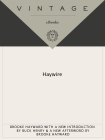Haywire by Brooke Hayward (book club books .txt) 📗

- Author: Brooke Hayward
Book online «Haywire by Brooke Hayward (book club books .txt) 📗». Author Brooke Hayward
When asked about this, Father answered, “Goddamn right, all that red tape every time I want to see you kids. Why does Maggie make a goddamn Dreyfus case out of everything? Simple plans, dinner. I used to ask her where she’d like to have dinner and it would take two hours to resolve what restaurant. Must drive you kids nuts. Thank God that’s not my problem any more. It’s funny, too, you know, she could be the most sensational dame in the world when she put her mind to it. Well, if the going gets too rough, you can always knock on my front door.” It seemed we were caught between two diametrically opposed points of view. Or three or four.
Therefore, when Mother let Bridget and me (Bill was at camp) visit Father in Bermuda for two weeks in the summer of 1953 before going off to boarding school, we were thrilled. We found him irresistible, although we hesitated at coming out and saying so. Somehow we believed a precarious balance might be disturbed if we opened our mouths. We foresaw two possible outcomes to any impulsive expression of love for Father: one, Mother would feel slighted, which would be bad enough; or two, she’d disapprove, and not let us see him any more. Either way we’d be jeopardizing the status quo, so we didn’t even let Father know how much we loved him.
That two-week trip was the longest stretch of time we’d spent with him in seven years. He was then at the height of his career. A series of hits like Mr. Roberts, South Pacific, and Call Me Madam had followed one right after another. He’d also, since 1948, presented Anne of the Thousand Days, The Rat Race, The Wisteria Trees, Daphne Laureola, Remains To Be Seen, and Point of No Return. The pressure of working on one of his productions, probably Wish You Were Here, had worn him out. Whenever he opened a play, Father went without sleep for days on end, and then, having pushed himself into a state of exhaustion, got on a plane to someplace quiet where he could sleep and sleep until he’d revived. In Bermuda, he’d rise about noon, putter around the bungalow kitchen making a batch of brioches or croissants, and go back to bed until dinner. Bridget and I were in heaven. We weren’t accustomed to the luxury of hotel living, of unrestricted room service, of unsupervised time, of coral beaches and green seas right outside our window. At dinner every night, we ordered daiquiris and filet mignon—no questions asked, no expense spared.
This regime, or lack of it, was completely at odds with Mother’s stringent attempts to see that we led a relatively unspoiled existence. “Who the hell’s going to spoil you if I don’t?” asked Father, pleased at the effect our vacation was having. “Good for you to be spoiled once in a while. God, Maggie’s a tightwad—I wish to hell she’d buy you some decent clothes. Whenever you come to see me, you’re all wearing the worst-looking rags. I’m sure she sends you off like that deliberately. She knows I’ll have to outfit you from top to bottom before I can set foot on the street with you.” (This was true; we always came back from our infrequent weekends together with a new wardrobe from Bonwit Teller’s and Brooks Brothers, which Father would have devoted all Saturday to selecting.)
Perhaps the most important factor in any of our visits was the influence of our stepmother, Nancy. Father called her Nan, and that’s what she was to us. She was wonderful to look at, very tall and angular, with legs like a giraffe, yet in spite of that, she had a surprisingly voluptuous quality. Maybe it was her lips, or laugh, or just the way her flesh was attached to her bones. Nan wore a lot of Mainbocher. Her collection of shoes rivaled Father’s. She was a connoisseur of style, however it was packaged, and had learned, long ago, to define her own. When bad permanents and nightly sessions with curlers were in vogue, she wore her hair parted in the middle and austerely pulled back into a sleek chignon, and as if that weren’t gumption enough, she sported huge horn-rimmed glasses. (“I might as well see—don’t you think?—since my plan is to be around for a while.”) So there was a startling ambiguity to her presence; the spare and the sensual. Even her jewelry, each piece of it, evoked a sense of its owner: heavy gold and diamond earrings so oversized she had to unclip them to talk on the telephone, and a pin fashioned to resemble a boutonnière, set with a stone an inch or two in diameter—as big as an actual flower—a sort of boldness that nobody else could carry off.
Bridget and I loved to browse through her closets, and Bill loved to bask in her attentions. “Have some more pepper, Billy,” she’d say, with a chuckle, watching him grind black pepper over his smoked salmon until there was no pink visible. “You’re a man after my own heart. No bland diets for you and me. Load everything up with spice—that’s what life should be about.”
We also had a stepsister, Kitty, Nan’s daughter by Howard Hawks. Kitty was a pretty child, about nine years younger than I. She adored Father and, for a while, changed her name to Kitty Hayward. Although we were very fond of Kitty, we envied her the life we would





Comments (0)